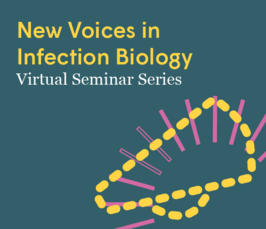Mathematical modelling of complex host-pathogen interactions in airway epithelial tissues
New Voices in Infection Biology
- Date: Feb 23, 2022
- Time: 04:00 PM (Local Time Germany)
- Speaker: Elisa Domínguez-Hüttinger
- National Autonomous University of Mexico (UNAM), Mexico City
- Location: Zoom video conference
- Host: Matthieu Domenech de Cellès
- Contact: vseminars@mpiib-berlin.mpg.de

If you are interested in joining the seminar, please contact: vseminars@mpiib-berlin.mpg.de
Once registered, you will receive a zoom conference link 30 mins before the talk starts - please sign in using your full name.
Talk abstract:
The body is constantly in contact with a myriad of different microorganisms, including virulent bacterial strains that can cause infection as they come in contact with normally sterile tissues, and commensal organisms that can, under pathogenic conditions, elicit aberrant host responses leading to tissue damage or infection. Many different host responses, such as immune system activation and tissue remodelling, counteract these microbial challenges, and are responsible for the healthy, homeostatic co-existence between the host and the microorganisms. However, many genetic and environmental factors including mutations, polymorphisms, previous infectious events, or weakened immune responses, can disrupt these complex interactions between the microorganisms and the host. Such aberrant host responses underlie a whole spectrum of diseases, comprising several of life-threatening, severe pathological conditions such as invasive infections or chronic tissue damage which can result from unresolved inflammatory responses to pathogens. Due to the complexity and diversity of these host-microorganism interactions, classical experimental approaches focusing on isolated aspects of the host response might often not be enough to understand the resulting pathogenic mechanisms. Recently, novel systems biology approaches have been proposed to represent and analyse such complex host-microorganisms interactions. These approaches allow the systematic integration and analysis of clinical and experimental data, and to perform rigorous and systematic assessments of the role of different risk factors on the onset and progression of pathogen-associated diseases. In this talk, I will show how such a theoretical framework can be used to formally represent and computationally and mathematically analyse the complex interactions between the host and the microorganisms. Focusing on host-pathogen interactions on the airway epithelial tissue, I will show mathematical models can be used to infer possible pathogenic mechanisms that result from impaired host-microorganism interactions, and to design optimal treatment strategies that counteract these pathogenic mechanisms in a minimally invasive and patient-specific way.